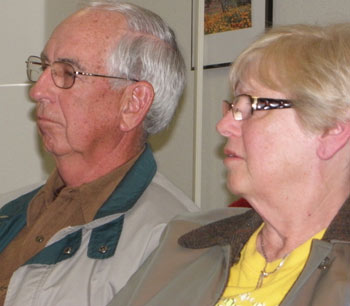BY LINDA BENTLEY | JUNE 4, 2014
Sorchychs prevail again in Freeman lawsuit
‘Defendants have established that plaintiffs do not have the exclusive right to use the property in question’
 PHOENIX – On Wednesday, May 28, the Arizona Supreme Court denied Gerald and Janice Freeman’s petition for review in their case against Don and Shari Jo Sorchych, upholding the Maricopa Superior Court’s granting of summary judgment to the Sorchychs, which was affirmed by the court of appeals.
PHOENIX – On Wednesday, May 28, the Arizona Supreme Court denied Gerald and Janice Freeman’s petition for review in their case against Don and Shari Jo Sorchych, upholding the Maricopa Superior Court’s granting of summary judgment to the Sorchychs, which was affirmed by the court of appeals.
The Arizona Supreme Court further granted the Sorchych’s request for attorneys’ fees.
The Freemans filed their complaint in February 2011 asserting they and only they had the exclusive right to use the south 33 feet of the Sorchychs’ property and claimed the Sorchychs’ may neither use nor tell others they may use the property subject to the alleged easement.
Superior Court Judge Mark F. Aceto, after reviewing the pleadings from both parties, declined to schedule oral arguments and on July 31, 2012, stated, “Defendants have established that plaintiffs do not have the exclusive right to use the property in question,” and granted the Sorchychs’ cross motion for summary judgment as to all claims.
In a footnote, Aceto noted the Sorchychs conceded that the Freemans, among others, may use the subject property, and later clarified that the Sorchychs had indicated they had no intention of preventing the Freemans from using the easement.
He also awarded the Sorchychs attorneys’ fees and costs.
The Freemans appealed.
On Dec. 17, 2013, the court of appeals affirmed the lower court’s ruling in favor of the Sorchychs, stating the Special Warranty Deed was unambiguous and, once recorded, the easement created by the document “runs with the land and burdens the servient estate’s sucessors.”
The Freemans, represented by Attorney Stephen Mahaffy, also argued the superior court abused its discretion by only awarding them $2,400 out of the $10,499 in sanctions they requested because the Sorchychs failed to disclose during the summary judgment proceedings they had executed a deed of gift of that 33-foot strip to the town of Cave Creek, which the town subsequently quit claimed back to the Sorchychs.
In awarding the sanctions, the court reviewed the Freemans’ declaration of attorneys’ fees and costs as well as all other related pleadings.
While Aceto did not explain why he believed $2,400 was an appropriate sanction, the court of appeals said Aceto could have concluded the Freemans’ counsel spent more time than necessary on certain items, as the Sorchychs argued.
The court of appeals also upheld the award of attorneys’ fees and costs to the Sorchychs, who were represented by Attorney Carol Lynn de Szendeffy, and granted the Sorchychs an additional award of attorneys’ fees and costs.
The court concluded, “[T]he exclusive easement reserved by the Special Warranty Deed did not grant the Freemans the exclusive right to use the 33-foot strip. Further, the superior court did not abuse its discretion in awarding sanctions and did not misapply A.R.S. § 12.341.01,” as it affirmed the superior court’s judgment in favor of the Sorchychs.
By denying the Freemans’ petition for review, the Arizona Supreme Court essentially upheld the lower courts’ rulings with an additional award of attorneys’ fees and costs.



